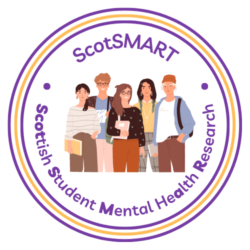Clara Sanchez-Izquierdo Lozano
The University of Edinburgh
MSc Psychological Research graduate | Research Assistant in UoE’s adolescent mental health projects | Aspiring change-maker
You’re on campus, you see other couples around you (although hopefully not in the library!), you see people holding hands… and maybe you wonder, what effect could a relationship in uni have on people? And especially, as important as it is, what effect could it have on mental health?
Some background
Mental health is an important topic during university, being a big focus on current young adult research. With this period being marked by lots of new challenges, such as independence, higher academic demands and making friends, it’s no surprise that this group is even considered to be one of the most vulnerable to many common mental health disorders.
University is a period where many new experiences happen, especially intense ones. These experiences include romantic relationships, which are different to friendships, as they’re characterised by a particular intensity and can provide emotional bonding. It’s therefore no wonder that romantic relationships have been seen to affect mental health and wellbeing. While romantic relationships can also be a source of distress, for instance because of a higher chance of being part of conflicts that can cause anxiety and stress, healthy romantic relationships have been seen to have a positive influence on mental health.
Some of these benefits can be because romantic relationships involve deeper intimacy and active communication, so they may serve as practice of better emotion regulation. In turn, better intrapersonal emotion regulation strategies (strategies we use on our own), such as practicing more cognitive reappraisal (positive reframing) and less expressive suppression (denying emotions) and more interpersonal strategies (strategies that involve other people) including enhancement of positive affect and perspective-taking, have been seen to help in emotions’ processing.
EMA
As emotion regulation is something that happens in the course of our daily lives, a useful tool to measure this is the Ecological Momentary Assessment (EMA) method. EMA involves measuring participants’ behaviours and experiences in real time and in their natural environments through for instance mobile phone apps (as easy as that!). This method therefore offers the possibility to measure near real-time emotional changes and their regulation, with less bias and more validity.
Despite these indications that romantic relationships should be important for mental health in university students (including via emotion regulation), previous research in this area has been limited, and even more using more novel methods such as EMA. So that is where our research comes into play.
Our study
In our 2023 study, we investigated the effect of having a romantic relationship on mental health, focusing on depression, anxiety and stress, through emotion regulation strategies. We hypothesised that emotion regulation (intra and interpersonal) would mediate the effects on mental health. To test this, participants first completed an online questionnaire, with mental health, emotion regulation, relationship status and relationship satisfaction measures, and then downloaded an app to receive several daily EMA short survey prompts for 7 days.
Our results
Our findings suggested that the inter-relations between romantic relationships, emotion regulation and mental health are quite complicated. For example, while positive strategies to regulate one’s emotions were related to better mental health and negative strategies to poorer mental health when reported through more traditional questionnaires, we found the opposite effect for cognitive reappraisal when this was reported through the more novel EMA. These findings are perhaps best explained as those who have poorer mental health need to actively regulate their emotions more often. What’s more, when reported through the questionnaire, having a relationship was actually related to more negative mental health, being detrimental for anxiety, with relationship satisfaction not having any effect when reported through either method. Nevertheless, having a romantic relationship did affect perspective-taking positively, seen through EMA.
Conclusions
Our study shows that romantic relationships might be related to mental health and emotion regulation in ways that are not straightforward and certainly invites more research on the topic. It also showed the value of capturing these experiences in the flow of daily life to gain new insights into real life moment-to-moment experiences of how being in a relationship and satisfaction with that relationship impacts emotion regulation. One possible benefit of being in a relationship could be enhanced perspective-taking; however, beyond this there wasn’t compelling evidence that merely being in a romantic relationship makes a huge difference to emotion regulation and mental health in students. Possibly, future studies that capture more diverse aspects of relationships can shed further light on whether there are key active ingredients in relationships that make them good, or bad, for student mental health.
Happy Valentine’s day and remember to love (yourself)!!!! <3<3<3<3



